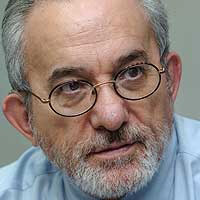 |
 |
 |
 Editorials | Opinions | December 2006 Editorials | Opinions | December 2006  
Brave Mexican Editor Set Example for US Reporters
 Mary Sanchez - Kansas City Star Mary Sanchez - Kansas City Star


| | J. Jesus Blancornelas |
The journalism of J. Jesus Blancornelas hearkened to phrases etched in stone above the halls where US journalists earn degrees: “The truth shall set you free.” “The pen is mightier than the sword.”

For Blancornelas, the pen had to be mightier than the machine gun. Mexican drug cartels ordered his death.

Thankfully, they failed. Blancornelas, editor and cofounder of the Tijuana-based newsmagazine Zeta, lived a full life until November 23, when he died of natural causes at 70.

This is how he told his story to a group of journalists I was lucky enough to be a part of, one night several years ago in a marble-laden Tijuana hotel. I’ve never forgotten his words. Blancornelas’ brand of journalism puts the US media to shame.

Blancornelas arrived flanked by armed guards. The security detail, provided by the Mexican military, accompanied him around the clock, since a gunman nearly assassinated him in 1997.

The attempt on his life read like a Hollywood script. Blancornelas’ driver notes a car of drug dealers. Not a surprising sight in Tijuana, or to Blancornelas who wrote explicitly about who sold drugs, accepted bribes, including the involvement of police.

The other car blocked the road. The window rolled down. A gun pointed out. Nearly 200 bullets later, the driver and the gunman were dead and Blancornelas was dying. A week passed before Blancornelas regained consciousness. Four bullets hit him, one in the spine. He was given last rites.

Blancornelas did not provide all the details that night in Tijuana. He simply referred to the day as “the accident.”

His newsweekly had long broken the journalism conventions of Mexico, where far too many reporters take bribes, or simply print government press releases verbatim.

After he recovered, the mantra of Blancornelas became: “God did not let you die. You must continue where you are. And you must fight.”

“If I had retired I would have put my colleagues at risk,” he said.

Meaning the drug traffickers would have proved it possible to scare journalists away from the truth. Two other Zeta journalists, an editor and Blancornelas’ cofounder, were murdered for their work.

From a US reporter’s perspective, the Mexican press is a surreal world. Zeta had issues confiscated and was shut down once by government officials claiming union abuses.

“Repression hasn’t altogether left, and freedom hasn’t really arrived,” Blancornelas said of Mexico.

But perhaps the most interesting theme of that evening was that Blancornelas framed his talk as a plea to the United States.

“We have a need to understand ethics better, freedom better,” he said. “The only way is to look north. I believe the more Mexican journalism looks north, the better we may be.”

Yes, that is true in some ways. But US journalists need to look south for heart, for soul. To fully appreciate the safety under which most of us do our work. We are the country with the greatest press freedoms, often making the least use of them.

Blancornelas did not gauge what he wrote by consulting a focus group. He wrote what people needed to know. American reporters fret about copy hacked of flavor, ever-shrinking news space, readers who complain our words are too liberal, too conservative. All are inconsequential in the broader view of Blancornelas’ journalism.

Even the very real clamping down on American press freedoms since the terrorist attacks of September 11, 2001, is a trifle by comparison. Having a freedom of information request denied, or being told “no access” by an official? Try losing the ability to leave your home without an armed guard at your side, a bulletproof vest across your chest.

Mary Sanchez is an opinion-page columnist for The Kansas City Star. Readers may write to her at: Kansas City Star, 1729 Grand Blvd., Kansas City, Mo. 64108-1413, or via email at msanchez@kcstar.com. | 
 | |
 |



